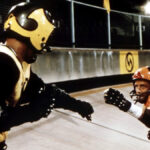Home Video Hovel: La Cage aux Folles, by Craig Schroeder
As an entity, La Cage aux Folles is easy to define: it is a transvestite nightclub in Paris, run by an aging, bickering gay couple. But defining La Cage aux Folles, the 1978 film, is a bit more difficult. It’s frequently described as a farce, only because that’s the easiest sub-genre to assign. And it is a farce, without question. It’s also a satire, a romantic comedy, a fish-out-of-water story, a screwball comedy, a tragic love story, a redemptive love story and a black comedy, amongst others. But most importantly, it’s goddamn hilarious from beginning to end without trying to be any of those things.
From its opening sequence, La Cage aux Folles lets the audience know that it absolutely does not care if you think it’s funny and it’s not waiting for you to get on board. Director Edouardo Molinaro has a confidence and unflappability that is evident from the first frame. Before we meet any character’s we’re introduced to Molinaro’s style through a series of kinetic and fast paced tracking shots that weave through the club on a particularly bustling evening. His filming is frenetic and gonzo in a way that establishes a world in which his outlandish and garish characters can exist.
Renato Baldi (Ugo Taganazzi) and Albin Mougeotte (Michel Serrault) are long-time partners, owners of La Cage aux Folles and they hate one another, except when they love each other. Renato runs the day to day operations and Albin headlines the club’s revue as Za Za Napoli. As Za Za, Albin is a confident and sexy drag queen. But Albin, himself, is an over-medicated, insecure mess who struggles to deal with his advanced age and a partner who no longer finds him attractive. Taganazzi and Serrault hit every comedic beat of a Laurel & Hardy or an Abbot and Costello. Taganazzi’s Renato is the straight man, his delivery is dry and biting. Serrault’s Albin is the buffoon from the moment he’s introduced, shrieking where an inaudible gasp would do and wearing sheets over his head so as to avoid conversation. But unlike most vaudeville comedy troupes, Taganazzi and Serrault are able to bring a tragic element to their characters that makes them more human than clown.
Renato learns that his adult son, Laurent (Rémi Laurent), is engaged to a young woman named Andrea (Luisa Maneri) he met at university. Andrea’s father is Simon (Michel Galabru, who is the perfect foil to Renato and Albin), a deputy for the Union for Moral Order, an embattled Moral Majority-esque organization in France. Afraid of what Andrea’s parents will think, Laurent asks his father to host a dinner as a straight, married diplomat, which includes hiding Albin, taking down copious amounts of Addonis-esque artwork and requiring the maid, a young gay man named Jacob who’s partial to hot pants and shoeless-ness, to wear a tuxedo and loafers.
Though La Cage aux Folles debuted thirty-five years ago, and existed as a stage production five years before that, it feels more relevant and contemporary than a lot of comedies today. Molinaro (as well as Francis Veber, Marcello Danon and Jean Poiret, who all share screenplay credits) are absolutely fearless joke-tellers, willing to lampoon, not only their characters, but traditional symbols of masculinity. “Walk like John Wayne” Renato tells Albin, who plans to meet Andrea’s parents as Laurent’s eccentric, but definitely not homosexual, uncle. And where as some comedies forsake joke structure, in favor of letting a crude premise do the heavy lifting, La Cage aux Folles, while often crude, never forgets what makes a joke a joke.
It’s also worth noting that the film’s score was composed by famed Italian musician Ennio Morricone. Most known for brooding spaghetti westerns, Morricone’s composition changes gears for a more whimsical and meandering score, never taking center stage but providing the perfect bed for the characters. Though most of Morricone’s music throughout the film is comical, there is an uproarious, but brief, genre parody, that let’s Morricone have fun inside the genre that has come to define him.
La Cage aux Folles has existed as a stage play both before and after it’s 1978 release, was rebooted as The Birdcage by director Mike Nichols in 1998 and is now being re-released as a part of the Criterion Collection. And it’s prestige is deserved; it is a comedy that is able to make fun of it’s heroes and heels without ever condemning them. It is a comedy that allows it’s story to be driven by its humor rather than in spite of it. Trying to confine La Cage aux Folles to a certain sub-genre does it a grave disservice; the film is wonderful and any bickering over what kind of wonderful it is should be secondary.































